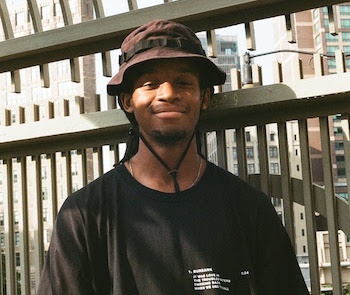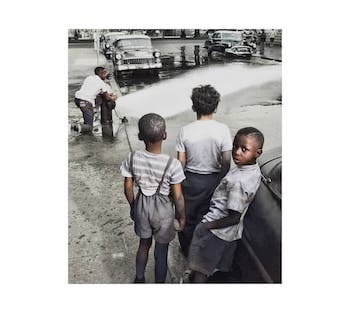Music Interview: Talking with Cisco Swank about His New EP — and the Roots of Creativity
By Gabe Sherman
“You’re always gonna be yourself, your unique self, so it’s important to incorporate the things that you really love.”

Francisco Haye, aka Cisco Swank — He may be young, but he’s comfortable with who he is and aware of who and what has made him that way. Photo: courtesy of the artist.
Francisco Haye, known professionally as Cisco Swank, is a careful observer. When I asked him how he’s trying to grow as a lyricist, he responded, “I’m reading more…that’s definitely helping my writing.” He is also concentrating on his surroundings, moving through the world with open eyes and ears, listening to conversations on the street or what the pastor says in church. He notes all of this on his phone. When it’s time to write, Haye often runs with whatever idea comes into his mind first. “I’ll take a lyric from something else, like a song I’ll hear. I’ll just take that one lyric that really stuck with me. And just start out with that and go from there…like a prompt.”
Haye’s creative process is informed not only by what’s around him, but by those who came before him. His musical influences are wide-ranging — from the church music he grew up with, to Earl Sweatshirt, to Robert Glasper, Herbie Hancock, Keith Jarrett, and others. His power as a songwriter lies in his ability to lean hard into those influences without ever sounding derivative. Haye elaborates and invents, conjuring up genre-bending sounds that are very much his own: “You’re always gonna be yourself, your unique self, so it’s important to incorporate the things that you really love.”
On his new EP, Pursuit Of, Haye blends elements of jazz, funk, soul, and hip-hop to create, in his words, “something that kind of pays homage to all black culture, all black music.” The opener, “Burbank,” nods to ’70s Curtis Mayfield–era soul, while the darker and smokier “What Was” blends elements of Chicago rap and neo soul. On “Internal/Eternal,” Haye tips his hat to jazz, stepping back to let Morgan Guerin tell most of the story on his sax. “Harlem,” with its choppy sampling and MIKE-inspired flow, is a nod to the gritty rap that’s coming out of New York right now.
“I see music in terms of…moods and colors,” Haye explains. “So like Glasper, he’s a lot of blues, dark blues, and purples, and grays. And that just has to do also with the cadences that he plays and different colors that he uses, literally like tensions and stuff.” The grays, browns, and faded blues in Pursuit Of’s cover photo reflect the colors the musician hears in his album. Haye is very concerned with continuity: “A lot of really great artists, they have great visuals to them. Like, BROCKHAMPTON, they have great music videos and things that represent their music. And then when you’re just listening to it, you’ll be like, ‘Oh, I can see what they’re doing there.’ And I definitely try to do that, musically.”
In the cover photo, snapped in Harlem in the ’60s, three Black children stand in the foreground. One boy looks inquisitively and searchingly toward, but also past, the camera. Haye wanted an image taken in a historically significant place for Black Americans. The boy’s eyes seem to ask, “What’s next? Is there more? What’s out there?” And that is what Pursuit Of is about: “Just that ‘pursuit of’– that longing.”
Across the EP, Haye sets up dichotomies: past and future, lost and found, caged-in and free. To him, the uncertainty set up by those polarities speaks to today, in dramatic as well as mundane ways. As he puts it, “I feel like normal recurring themes are just trying to figure stuff out. And sometimes not being sure of what’s to come, of what the future holds.” Recently, Haye had to deal with the effects of that uncertainty firsthand. His debut full-length album was supposed to come out early this year. Then: “Corona happened, and school, and stuff like that. So, I thought it would be better to drop a smaller project first and wait until things kind of open up, because I’m really trying to play shows once I drop another project.” Now, he hopes to release that debut LP, which will be mostly self-produced, sometime around the end of this year — if he’s able to tour by then. Whether that will happen or not remains to be seen.

Still, the arrival of the EP, the upcoming album, and a potential tour mark Haye as an up-and-comer despite the delays. He is casual about his success: “It’s like things are kind of falling in place,” he says of his recent success. On Instagram, he’s followed by many musicians, including members of the influential sLums collective and other New York–based musicians like KeiyaA and maassai. Even Massachusetts congresswoman Ayanna Pressley follows him. “It’s really crazy, bro,” he confesses, “I think I’m at a point where I’m trying to reach more people. I think I’m trying to make the type of music — well, make a lot of different types of music — kind of together, to reach more people. And with that whole thing with Earl Sweatshirt being like, ‘Yo, I was never even trying to be famous. Yo, I’m just trying to make music that’s true to myself.’ And that’s literally why he’s such a big influence to me, just staying true to yourself. But I think I can still do that and reach more people. I think that’s the goal right now. Especially making the type of music I’m making, which is more harmonically or rhythmically intricate than some other music.”
For a guy as serious about his art as Haye is, he’s notably down to earth. His language is filled with ‘dude’s, ‘bro’s, and ‘highkey’s, and when our conversation drifted to him referring to Boston as a ‘boneless Brooklyn,’ he belly laughed before justifying his comparison with the lack of delis and quality pizza along with the T’s early closing time. While it’s clear that he sees music as a career, Haye’s primary motive has nothing to do with money — he just loves it. “Every day, I’m just like, oh, I want to make something or create something, which I think is really important.”
His goal for the future is to spread that joy by putting together an organization that will give other kids of color access to tools that will help them make music a career. In the short term, he’s been weighing what he can do to be an active member in the fight for social and racial justice. One decision: an extended version of Pursuit Of will drop soon, and he plans to give the proceeds to a social justice organization. But he’s also been trying to figure out how to push political considerations into his music: “People or creatives should make it a move to have [the state of the world] on their mind and incorporate whatever they’re feeling into their art,” he says, “because I think that’s the only way art can move forward.” On the upcoming LP, his goal is to “be more conscious, both lyrically and sonically.”
A few months ago, KeiyaA (in a tweet that’s now deleted) pointed out that artists have been engaged in a cycle of creation and cultural commentary, and that these perspectives are more critical than anything a reviewer might have to say. I kept thinking about that tweet after Haye and I finished our conversation. Artists can be hesitant when it comes to acknowledging their influences, fearing that their work will be dismissed as merely imitative. But Haye isn’t worried about that. By openly drawing on the music that preceded him, he’s part of an ongoing dialogue. He may be young, but he’s comfortable with who he is and aware of who and what has made him that way. His participation in a constant sonic conversation places him within a movement that is pushing music forward, blending sounds of the past with the present: “Paying homage and being like, oh, music wouldn’t be where it is without these things, and just recognizing that in my music. I think it’s been a really important thing for me.
Gabriel Sherman is a student and writer from Brookline, MA, currently studying history at Pitzer College.

[…] Music Interview: Talking with Cisco Swank About his New EP – and the Roots of Creativity artsfuse.org […]
[…] Music Interview: Talking with Cisco Swank About his New EP – and the Roots of Creativity artsfuse.org […]
[…] Music Interview: Talking with Cisco Swank About his New EP – and the Roots of Creativity artsfuse.org […]